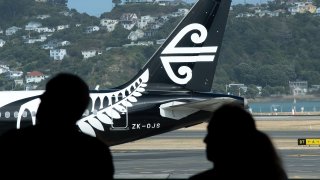
An Air New Zealand airplane waits for passengers at Wellington International airport on February 20, 2020.
- Air New Zealand will start asking passengers to weigh themselves before boarding flights in a survey of more than 10,000 customers travelling on its international network.
- Pilots need this data to calculate the weight and balance of the loaded aircraft before it takes off, Air New Zealand said.
- "Now that international travel is back up and running, it's time for international flyers to weigh in," the airline said in a statement.
Air New Zealand will ask passengers to weigh themselves before boarding international flights in a trial that aims to improve fuel efficiency.
The carrier said Monday that over the coming weeks it will ask more than 10,000 customers traveling on its international network to take part in its passenger weight survey before they board.
Watch NBC 4 free wherever you are
Air New Zealand said pilots need to know the weight and balance of the loaded aircraft before each takeoff.
The move comes after a rebound in international travel over the past year or so following the lifting of Covid-19 restrictions.
Get Tri-state area news delivered to your inbox with NBC New York's News Headlines newsletter.
"Now that international travel is back up and running, it's time for international flyers to weigh in," the airline said in a statement.
The company previously weighed travelers on its domestic flights in 2021.
Money Report
"We know stepping on the scales can be daunting. We want to reassure our customers there is no visible display anywhere," Alastair James, an Air New Zealand official specializing in load control, said in a press release.
"By weighing in, you'll be helping us fly safely and efficiently every time," James said.
Air New Zealand said its survey would take place at the entrance to the gate lounge of certain flights departing from Auckland International Airport between May 29 and July 2.
It is not the first airline to ask travelers to weigh themselves before flying.
Finnish airline Finnair started weighing its passengers back in 2017, with the aim of updating over a decade-old data on average passenger weights.
That's because many carriers still use data from the European Aviation Safety Agency, now known as the European Union Aviation Safety Agency, that dates back to 2009.






